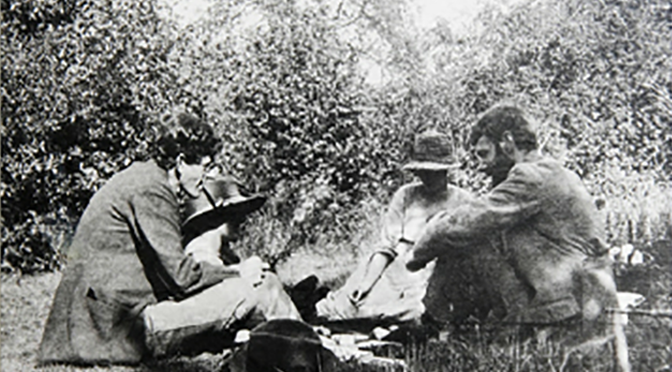Yesterday, as I was searching for the Erica Jong quote about cunnilingus, I came across a wonderful sentence of hers that I don’t want to deprive you of:
“For as long as anyone can remember, books have been written with semen, not menstrual blood. Until I was 21, I measured my orgasms against those of Lady Chatterley and wondered what was wrong with me. Did it ever occur to me that Lady Chatterley was really a man? That she was really D. H. Lawrence?”
(Erica Jong: Fear of Flying)
Until the 1930s, erotic literature was dominated by men. They narrated from their point of view and thus defined the status quo of sexual interaction. And of course “Lady Chatterley” is a male novel. The fact that he delved further into the psyche of his female protagonist than any other author ever has does not change that.
This may have been less of a literary achievement on Lawrence’s part than the spirit of the times. Sigmund Freud had just popularized psychoanalysis, and in intellectual circles it had simply become hip to delve into the psyche. No wonder this also found its way into erotic literature.
Among the people who devoured Lawrence was Anaïs Nin, then living in Louvecienne near Paris. In the winter of 29/30, she discovered Lawrence for herself and devoured all his works within a very short time. He became her role model. And so she decided to compile the notes she had made while reading into an essay about Lawrence. According to her biographer, Deirdre Bair, writing about Lawrence marked “the real beginning of her own search for herself as a writer.”
It was Lawrence who led her to believe a writer needed to “hide behind poetic circumlocutions and allusions in order to write about sex.” With his way of bringing together intellect, imagination, and bodily sensibility, he became one of the first modern writers to find the courage to call a spade a spade. For society was in a state of flux after the end of World War I – and Lawrence was one of the first to point this out in his books.
Without a doubt, Lawrence was an epiphany for Nin, a revival experience. And without him, Anaïs Nin would not have become the classic of erotic literature that she is considered today. But I think Erica Jong was well aware of this when she wrote the sentence quoted above about the explicitly male view of Lady Chatterley. Jong, a typical representative of the Women’s Lib of the 1970s, wanted to break down walls with her autobiographical, erotic novels and sharpen the view of the difference between male and female perspectives.
She did this by lashing out at anything that reminded her of the old status quo of the battle of the sexes. She ridiculed Sigmund Freud’s fixation on women’s desire for the always erect penis, claiming that this was merely a transference of Freud’s own desires. But this did not stop her from praising, a few pages further on, the always erect penis of her lover Alessandro as the ideal state.
In this respect, it is questionable whether Erica Jong’s female gaze was so fundamentally different from a male one, as she so readily points out in her book. On the other hand, “Fear of Flying” at the latest makes it clear that there are two different approaches to eroticism. Why should we leave it to men to write about our thoughts on sex? Why should we women even read such books by men who pretend to take a female point of view?
Marc and I have discussed this topic a lot and decided for us that Marc will no longer write erotica from a female point of view. Neither will I try to describe what goes on in men. The question of whether there is a specifically female and male eroticism will certainly occupy us for some time. We will keep you posted here on the progress of our discussions.
All the best to you,
Sandra
PS: Meanwhile, Marc is working on his series about casting shows, “Erotic Actress Talent Search,” in which women are again the protagonists. I am not happy about this development, but I have to accept it. I know how important the subject is to him – and like him, I think it reflects a phenomenon of our time and should therefore be dealt with in fiction.

